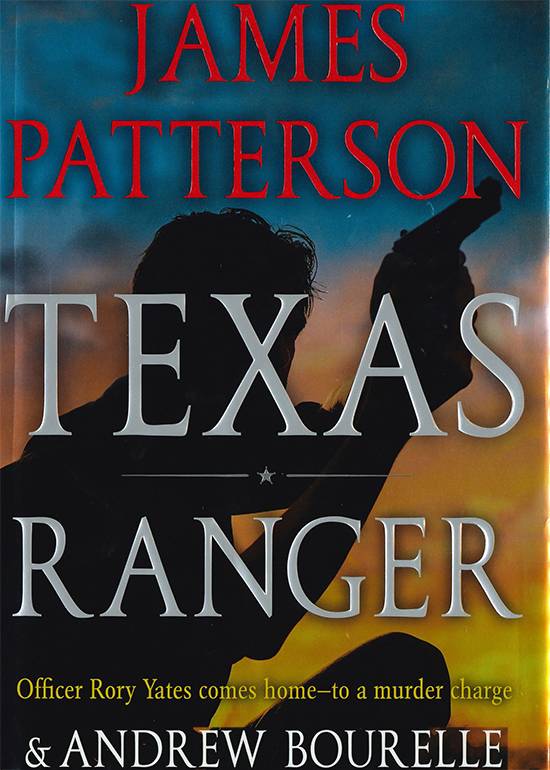Return of the White Hat

Texas Ranger
by James Patterson and Andrew Bourelle
New York: Little, Brown and Company, 2018.
337 pp.$28.00 cloth.
Reviewed by
William Jensen
The Texas Rangers have influenced the Lone Star State in almost every aspect from the foundation of the republic to the deplorable age of segregation. Many have written novels romanticizing their nineteenth-century roots, and several authors have explored their more contemporary exploits and offenses. Some novelists have taken the time to see how this law enforcement agency has transformed into a modern and efficient organization. Now, James Patterson has joined the list of Walter Prescott Webb, Larry McMurtry, and Elmer Kelton with his newest book, Texas Ranger.
Clearly, Patterson is not fascinated or intrigued by the complexity or drama behind the rangers; he wants to give a thrilling tale that will make readers turn the page as fast as they can. So, one has to accept this book for what it is and ask how well it achieves its goal. In other words: does Patterson’s Texas Ranger deliver the goods? For the most part… yes.
Texas Ranger starts strong. And fast. The first four chapters speed by with fury. These are broken into short nuggets to be gobbled down. Each chapter averages four pages, which makes it all too easy read a little bit more and a little bit more until it is way past your bedtime. This is typical of Patterson’s style, and it is effective. We’re immediately tossed into a high-stress situation involving Texas Ranger Rory Yates as he swerves his Ford F-150 through traffic as he has to takedown an ex-con. These opening chapters have an intensity that most writers would probably shy away from with opening lines such as, “I push my boot against the gas pedal, and the needle on the speedometer surges past one hundred miles an hour.” Later, Patterson writes, “My hand is eight inches from my gun, hovering there like a coiled snake ready to bite.” These are fun blocks of high-octane action.
The novel’s plot however is built around the murder of Officer Rory Yates’s ex-wife, Anne. The premise is problematic. If Patterson had established Yates as a reoccurring character, readers would be familiar with Anne and be emotionally involved with her death. Here we never get to meet Anne, and she is strictly a device and could have been just as easily a friend, a mentor, or even a beloved puppy à la John Wick. This crime also restricts Yates as a Ranger. He has to stand back and let the local police investigate. Again, in a running series this would be a nice deviation to the normal procedural, but as a stand-alone it feels misguided. Why have a protagonist be a Texas Ranger if for 90% of the book he has to act as a civilian?
Regardless, Yates is back in his hometown in Central Texas with his parents, brothers, and old high school sweethearts. He suspects Anne’s new boyfriend, Cal, of killing her, and he gets upset that the local police are not examining him closely. Yates rekindles a few old flames and starts a new one while also having conversations with his father who is secretly fighting lung cancer. The pace slows down incredibly. Or at least it feels slow after those first four chapters.
You might think I’m beating up on Patterson’s Texas Ranger, but I honestly think the book achieves exactly what it sets out to do and doesn't overstay its welcome. It just never challenged me. There were no shocking revelations or disturbing, memorable scenes. Yates wears a big white hat and doesn’t have a wart anywhere on him. He’s going to find the killer, and he’s going to bring about justice in his own style.
This novel, like others by Patterson, has a co-author. Some of Patterson’s regular collaborators include Max DiLallo, Brendan DuBois, Maxine Paetro, and (most famously) Bill Clinton. Here Patterson teams up with Andrew Bourelle whose debut novel, Heavy Metal, came out in 2017. Bourelle has already proven himself to be a strong writer. Heavy Metal was a gem of a book and a heart-rending coming-of-age narrative. In that book every sentence was tough, sometimes brutal, but always true. I wish Texas Ranger had more of Bourelle’s sense of risk and loss. Ultimately, Patterson’s Texas Ranger will satisfy most of his fans, and hopefully will also draw attention to Bourelle who deserves his own loyal fan base.
William Jensen is the author of Cities of Men. His short fiction has appeared in North Dakota Quarterly, Tinge Magazine, The Texas Review, and many other journals and anthologies. He is the editor of Southwestern American Literature and Texas Books in Review. Follow him on Twitter at @wjwriter.
